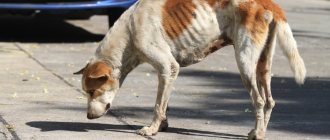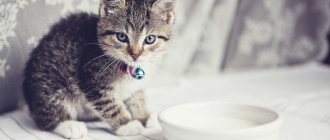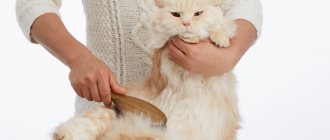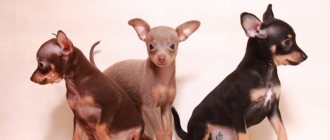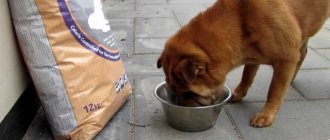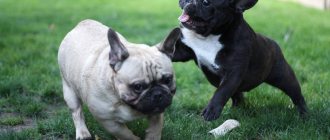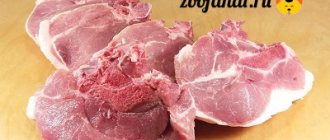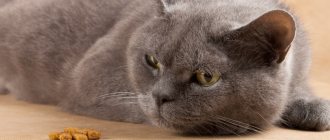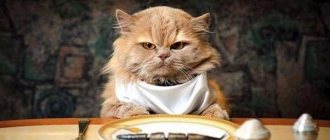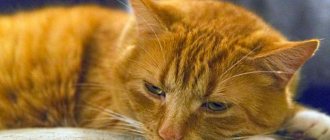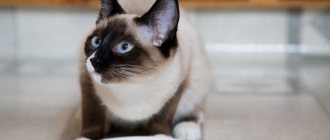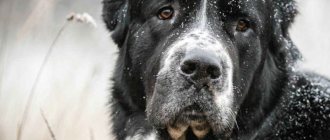Underweight is no less dangerous than obesity. Most often it is associated with poor living conditions and selectivity in food. Because of this, many owners try to cope with the problem on their own and are looking for ways to fatten their cat without seeking help from a veterinarian.
But we must not forget about pathological factors that affect appetite and nutrient absorption. In these cases, the animal requires mandatory treatment, so to be on the safe side, it should be scheduled for examination at a veterinary clinic.
Wasting in cats
It is useless to compare your pet with other animals. The weight norm is individual and depends on:
- genetics;
- age;
- breed affiliation;
- amount of physical activity;
- food quality;
- floor.
For this reason, you should not focus only on weight. In addition to it, other important factors can tell about exhaustion.
Weight standards
It is better to check the norm for a particular cat at the veterinary clinic, but you can give an objective assessment yourself. To do this, you will need to calculate your body mass index.
:
- Measure the circumference of the chest and the distance between the ankle and the knee on one of the hind legs, using centimeters to calculate.
- Divide the first number by 0.7062 and subtract the second number from it.
- Divide the result by 0.9156 and subtract the second number from it.
Thus, the formula for calculation is as follows:
BMI = ((X/0.7062 – Y) / 0.9156) – Y
where BMI is body mass index, X is the circumference of the chest, and Y is the distance between the ankle and knee.
If the result is between 9 and 30, your pet is in excellent shape. We speak of exhaustion when we cross the lower limit, and we speak of obesity when we cross the upper limit. In these cases, it is necessary to reconsider the existing diet and level of physical activity.
When can you talk about lack of mass?
In addition to body mass index, deficiency will be confirmed by visual inspection and palpation. The following signs will indicate exhaustion:
:
- protruding pelvic bones, ribs and spine;
- sunken stomach;
- lack of fat and muscle.
If you know the normal weight of your pet, then to determine the deficiency it is enough to weigh it. Weight loss of more than 10% of the initial value is equated to serious exhaustion.
Normal weight and causes of exhaustion
The average weight of an adult cat varies from 3 to 6 kg. This indicator depends on:
- Way of life.
- Genetic factors.
- Type and quality of food.
- Age and health status.
- Gender and breed.
Healthy pet A veterinarian will help determine the ideal weight for a particular cat. In addition, in order to monitor your pet’s health, it must be shown to a doctor once every six months.
| Breed | Small | Average | Large | ||||||
| normal | full | thick | normal | full | thick | normal | full | thick | |
| Abyssinian | 3.4 | 3.7 | 4.3 | 4.3 | 4.7 | 5.1 | 5.1 | 5.6 | 6.1 |
| British Shorthair | 3.7 | 4.2 | 4.8 | 4.8 | 5.3 | 5.7 | 5.8 | 6.5 | 6.9 |
| Scottish lop-eared | 4.0 | 4.5 | 4.8 | 5.0 | 5.5 | 6.0 | 6.0 | 6.6 | 7.2 |
| Sphinx | 3.4 | 3.7 | 4.1 | 4.3 | 4.7 | 5.1 | 5.1 | 5.6 | 6.1 |
| Persian | 3.8 | 4.2 | 4.6 | 4.8 | 5.2 | 5.7 | 5.7 | 6.3 | 6.8 |
| Maine Coon | 5.8 | 6.4 | 7.0 | 7.3 | 8.0 | 8.8 | 8.8 | 9.6 | 10.5 |
| Munchkin | 3.0 | 3.6 | 4.0 | 4.1 | 4.5 | 4.9 | 5.0 | 5.3 | 5.8 |
If the cat does not reach the lower limit of weight (based on the table above), this indicates exhaustion of the body. The reason may be:
Why is the animal skinny?
Sudden weight loss or difficulty gaining weight is due to physiological or pathological reasons. In the second case, the animal always requires the help of a veterinarian, since self-treatment can result in even more serious complications.
Physiological features
Physiological causes are associated with natural internal processes and non-hazardous interactions with the environment. These include:
- Hot weather.
Stuffiness and scorching sun are not the best conditions for eating food. Increased sweating complicates the digestion of incoming foods, so the main preference is given to water.
- Pregnancy
. In the early stages, pregnant cats often exhibit toxicosis. Due to nausea, they refuse their usual portions and lose weight.
- Sexual
hunting
. The hormonal changes observed during this period have only one goal - finding a suitable partner. All other needs, including nutrition, fade into the background. - Lactation
. All the energy of a nursing cat goes into producing milk. Even with normal feeding, she may lose weight due to regular loss of energy. If there are no mistakes on the part of the owner, the condition will normalize on its own after separation from the kittens.
- Stress
. Animals often lose weight due to anxiety, worrying about the loss of a beloved owner, the arrival of a new family member, regular injections or protracted repairs. After eliminating the irritating factors, they quickly recover.
You can handle all of the above situations on your own. But, if you notice alarming signs indicating pathology, take your pet for an examination. In this case, poor appetite and stable weight loss may indicate the presence of a dangerous disease.
Pathological factors
The appearance of pathological factors can be judged by the accompanying symptoms. Depending on the clinical picture, the following diseases can cause exhaustion:
- dental (stomatitis, caries, gingivitis), complicating chewing food due to pain;
- infectious (rinotracheitis, panleukopenia, calcivirosis), causing acute intoxication of the body;
- parasitic, characterized by the destruction of most incoming substances through helminths;
- diabetes mellitus, accompanied by depletion of fat reserves due to an artificial lack of glucose;
- pancreatitis, which impairs the absorption of nutrients;
- oncology, causing digestive disorders and poisoning from a decaying tumor;
- diseases of the endocrine system, reducing the volume of fat and muscle due to hormonal imbalance;
- intestinal and liver pathologies that impair the production of digestive enzymes and the absorption of nutrients.
All these conditions require mandatory treatment. Depending on the severity of the disease, your pet may need medication, a therapeutic diet, or surgery.
Lack of weight with excellent appetite
This situation is typical for forced starvation, when an animal is deprived of a constant source of food for a long time. This includes stray cats and lost pets.
Another possible reason is increased energy consumption. If your pet does not sit still, actively walks outside, plays with other four-legged animals and loves hunting, its portion should be significantly larger than normal. Otherwise, he will expend many more calories than he consumes.
Some picky eaters may not eat for several days, earning pity from their owners. Their main task is to get a more tasty treat instead of food they don’t like. In such cases, you should not succumb to provocations, since regular violation of the feeding regime will sooner or later affect your health.
Why does a cat lose weight?
How to feed a cat so that he gets better? It all depends on the reasons why he lost weight. Perhaps your pet does not need a diet, but treatment. Let's look at the main reasons for thinness in cats. For convenience, we will divide the reasons into two types.
Metabolism and individual characteristics
So, a cat can lose weight naturally without endangering its health. This process is explained by changes in metabolism. For example, most young cats appear thin because they are actively growing. While the cat's bones are forming, it does not gain weight, since the joints are not yet ready for stress. A sharp stop in weight gain can be observed in kittens whose teeth are changing. This is due to a temporary metabolic disorder and redistribution of the body's resources.
Nursing cats lose weight due to constant overload. It is important to switch your pet to an enhanced diet at an early stage of pregnancy. During feeding and during the rehabilitation period, the cat also needs body support, vitamin supplements and a diet rich in proteins.
Stress and hunger are, although negative, natural factors for losing weight. Very often, domestic cats lose weight quickly if they end up outside. A frightened animal climbs into a shelter and stays in it for as long as possible. The strength leaves the pet's body very quickly because it does not eat or drink. When the feeling of hunger becomes critical, the cat, if it has enough strength, comes out of hiding. Unfortunately, many domestic cats die from exhaustion if their owners do not detect them in time.
Weight loss due to dehydration is also a predictable phenomenon. For normal digestion and absorption of food, the cat’s body must have enough water. Rapidly progressive dehydration occurs with frequent vomiting, diarrhea, overheating, poisoning, etc. When there is a risk of loss of moisture, and the cat refuses to drink, its body must be supported by introducing buffer solutions.
Many cats lose a lot of weight after illness or major surgery . In this case, the cause is a combination of several factors. Anesthesia leads to intoxication and dehydration. Treatment with strong drugs contributes to the development of dysbiosis and dehydration. Severe pain causes the cat to refuse food and water, which leads to weakness and dehydration. As you can see, there is one common feature - lack of water.
Thinness may be a consequence of improper feeding or incomplete absorption of food . In this case, the cat eats a lot, but loses weight. The most common reasons are mixing dry food granules with natural food and feeding regular food from the table.
Weight loss as a symptom
Unlike physiological causes, pathologies that lead to weight loss cannot be treated with diets and care. If you suspect that your pet is not feeling well, be sure to show it to the doctor! The simplest diagnosis you may encounter is dysbiosis . It’s not pleasant, but this condition can be eliminated by taking a course of probiotics and adjusting the diet.
You can feed your cat the best foods and on a schedule, but it will not help you gain weight if:
- The animal suffers from helminthic infestation - worms not only interfere with the absorption of food, they constantly poison the cat. Worms, like all living organisms, eat and excrete waste products. The waste products of worms are toxic to cats, and the more parasites, the more negative the effect. Be sure to prevent worms for your pet, even if he does not go outside.
- Dehydration is observed - until there is enough water in the body, food will not be absorbed. If the cat does not drink on its own, the water balance is brought back to normal by subcutaneous infusions of saline, ringer's solution, glucose and other drugs.
- The body is affected by an infection or virus - the standard reaction to the disease is a change in body temperature. During a fever, food in the intestines quickly disappears and is not completely absorbed. If the temperature is too low, blood flow slows down, causing tissue cells to starve.
- The intestines cannot digest food - an expected phenomenon if the cat suffers from pathologies of the intestinal tract, dysbiosis, or receives food unsuitable for eating.
- The cat suffers from anemia - a condition accompanied by a decrease in hemoglobin levels, which leads to oxygen starvation of the cells. An anemic cat will lose weight even if she eats well because her cells are unable to absorb nutrients.
- Immunodeficiency is observed - the destruction of leukocytes, this is only the beginning of a chain that always leads to a change in the blood formula. In animals with immunodeficiency, a sharp and very significant weight loss is observed, against a background of weakness, apathy and a clearly painful state.
Important! If your cat refuses food or water, there is no need to self-diagnose.
The symptom is very broad and can indicate pain, virus, infection, injury, etc. Be sure to consult a doctor for a comprehensive examination and diagnosis. Insist on drawing blood for a detailed analysis. If tests show abnormalities, the doctor will know in which area to look for the abnormality.
What natural foods to feed your cat to make her gain weight
When fattening, you should avoid too fatty foods (pork, lard, cream) and feeding from the human table. Such food worsens the functionality of the gastrointestinal tract, causing new complications.
The main emphasis should be on calorie content, choosing foods with high energy value. It is recommended to include in the menu:
- chicken, rabbit, lamb and veal, containing large amounts of animal protein;
- boiled vegetables (zucchini, pumpkin, carrots), bran and oatmeal, enriched with fiber;
- sea fish, offal, chicken and quail yolks, characterized by a wide variety of vitamins and minerals in their composition;
- fermented milk products with low fat content, which have a beneficial effect on the functioning of the cardiovascular system and the musculoskeletal system;
- jellied cartilage, containing collagen beneficial for joints;
- buckwheat and rice porridge, which normalize peristalsis and digestion.
Instead of milk, it is better to use artificial milk formulas from a pet store. Otherwise, your pet may have digestive problems.
Recipe No. 5
Milk breakfast:
- Powdered milk - 1 tbsp. spoon.
- Chicken eggs - 2 pcs.
- Cottage cheese - 3 tbsp. spoons.
- Chopped vegetables - 2 tbsp. spoons.
Add a few tablespoons of cold water to the milk powder, then beat in the eggs and bring the mixture until smooth. Gradually stir in cottage cheese and vegetables. Pour the mixture into the pan and cook for 2 minutes on each side. Cool, cut and serve to your pet.
Milk breakfast
Attention! Remember, no salt or spices should be used in any recipe. They will irritate the animal’s receptors, which will negatively affect its sense of smell and perception of taste.
Dry food for weight gain
Veterinarians advise paying attention to the treatment line marked Gastro Intestinal. Such feeds are characterized by increased calorie content, which allows you to regain lost volumes in a fairly short time.
If you are underweight, the following options for dry granules
:
- Veterinary Diet Cat Renal from Eukanuba, recommended for the treatment of liver and kidney diseases;
- Senior Consult Stage 2 High Calorie from Royal Canin, suitable for older cats with impaired nutritional absorption;
- Convalescence Support from Royal Canin, designed for recovery from surgery and severely debilitated animals;
- Renal Special RSF 26 Feline from Royal Canin, designed for cats with chronic renal failure.
At first, it is better to replace the “crackers” with wet food from the same line. They have a more pronounced aroma, which helps restore lost appetite. Once they feel better, they can be given out as treats, combined with dry food.
What feed is best to use?
If the cat is very thin and emaciated, then a veterinarian will help you choose the right diet. Most often, experts recommend using ready-made dietary products that are sold in pet pharmacies.
The most popular brands are:
- Hill's a/d;
- Royal Canin Recovery;
Royal Canin Recovery food is well suited for cats that are weak or sick, it is easily digestible and gives the animal a lot of energy.
- ProPlan Convalescence.
All these diet foods are produced in the form of soft food - pates. This form was not chosen by chance. Soft food is easier to digest, and this is what a depleted body needs. The gastrointestinal tract will not be overloaded and the cat will not spend extra energy on digestion. If the cat is exhausted to such an extent that she can no longer eat on her own, then this kind of nutrition can be easily administered through a tube.
The food is distinguished by a high content of elements such as fat and proteins, vitamins and minerals. Thanks to this composition, the body recovers faster.
Wet food is also used for emaciated kittens. This diet is high in calories and also contains more vitamins necessary not only for recovery, but also for growth.
It is better not to use dry food during this period. They belong to tough and solid foods. Depending on the reasons for weight loss, not every cat will be able to easily digest such food.
Supplements and vitamins – are they necessary?
The need to add vitamins depends on the type of diet. With dry feeding, all the necessary substances are already present in the composition, so additional elements can cause a surplus.
The opposite situation is typical for natural feeding. In this case, vitamins simply must be present in the diet. But even here you can provoke their excess by trusting the advice of friends. It is better to clarify this question with a veterinarian, who will select a ready-made complex for your pet based on the test results.
How not to harm your health
The main mistake of all cat owners is abruptly switching the cat to a new type of food, since this not only will not help fattening, but, on the contrary, will cause nutritional stress. Also, if possible, avoid mixing two different diets, since if problems arise, it will be more difficult for the veterinarian to understand the cause of them. During fattening, you must not exceed the single serving of feed indicated on the packaging. Be sure to give your cat a chance to drink enough, as dry food makes him very thirsty. If your pet drinks too little water, it can lead to the development of urolithiasis.
Fattening a cat so that he is fat is not so difficult, and with specialized nutrition it will not be difficult at all. Health to your pet!
When to contact a veterinarian
If you are not sure about the cause of exhaustion, sign up for an examination. Taking tests and undergoing an ultrasound will never be superfluous. If there are no alarming symptoms, you can postpone the visit for a couple of days to observe the pet’s behavior.
You should not delay contacting a veterinarian only if your condition steadily worsens, you refuse to eat for more than 2 days, and you lose too much weight. Particular attention should be paid to kittens. They should not fast for more than a day, so a small pet should be taken for examination immediately after a deterioration in appetite.
When a cat needs feeding
Before you start fattening a cat, you need to think carefully about everything. If the animal is healthy and does not starve, it means that it is able to independently control its body weight and the amount of food consumed. You can start fattening your pet only in the following cases:
- If the cat is exhausted by illness . The most common cause of wasting in animals is various parasites. In addition, the animal’s body is negatively affected by diseases of the digestive system such as gastritis and stomach ulcers. Dysbacteriosis is very dangerous, which can lead to frequent vomiting and, as a result, rapid weight loss. To rehabilitate a cat, he will need a proper and balanced diet.
- Rehabilitation of stray animals. The diet of street cats is extremely poor and does not contain all the necessary vitamins, microelements and nutrients. Usually they end up with new owners with varying degrees of neglect. It is best to first take him to the veterinarian for a comprehensive examination, vaccination and diet selection.
- Fattening a cat in preparation for an exhibition . Animals are often put on a special diet before a show to help them gain weight. The fact is that each breed has its own standards and deviations from them before the exhibition are unacceptable. If the animal is too thin and active, then most likely the cat will actually have to be fattened after exhaustion. For minor deviations, fattening is not necessary, but if such a need arises, it is best to first show the animal to a veterinarian.
- Recovery after prolonged stress . If a cat was taken from a family where he was treated poorly and not given proper attention, then most likely he will be malnourished. The fact is that an animal that is constantly experiencing stress is susceptible to complete loss of appetite, digestive disorders and other negative effects associated with psychological disorders. He may require long-term rehabilitation and specialist help, so be extremely careful when handling him.
- Elderly age . It is very rare to see a well-fed cat who is already in his twenties. This is due to the natural processes of aging, such as slowing metabolism, decreased activity, tooth decay and some others. As a result, the cat begins to eat little due to the accompanying pain. That is why you need to very carefully choose the diet of such an animal and monitor literally every calorie in order to maximize the life of your pet.
Features of feeding kittens
Kittens are fed in the same way as adult animals. The only difference is in the volume of portions, frequency of feeding and the list of acceptable foods. If an adult cat needs fewer calories, then kittens need significantly more. In addition, they can be fed up to 8 times a day, but in small portions.
Before all the molars appear, the menu should be less varied, but always balanced. For this reason, it is much easier to use ready-made dry food.
Ways to fatten a cat
The word "fattening" can have a double meaning. You need to understand that you need to try not to just fatten the cat to a large size by giving him fatty foods, since sooner or later this will hit the liver. The animal requires a balanced diet rich in proteins and carbohydrates. Fattening is the restoration of the cat's health and weight and normalization of its digestion. However, it should be taken into account that the cat’s narrowed stomach is not able to take large portions of food at once, so the diet should gradually gain momentum. To fatten a skinny kitten, you need to follow the same principles, but proceed with more caution.
How to fatten a cat without it being fat
When fattening, it is important not to overdo it, as obesity can cause even more problems. To do this, be sure to control the growing indicator and avoid the most common mistakes.
Weight control
Weigh your pet on a floor or kitchen scale every week. If you gain too quickly, adjust your daily caloric intake or add more activity.
What mistakes should you avoid?
Self-feeding is often accompanied by mistakes. For the safety of your pet, try to avoid sudden changes in diet or mixing different types of food, handouts from the table, uncontrolled eating and infrequent feeding. All these situations can lead to indigestion or obesity.
Recommendations
As mentioned earlier, exhausted cats have reduced stomach volume, which is why they sometimes cannot cope with the usual portion of food. Therefore, at first you need to give the animal small portions of food, gradually increasing them. This way you will help his body adapt to the new food.
When planning your pet’s diet, follow these simple rules:
- any piece of meat that you are going to give to your cat must be carefully examined for the presence of parasite eggs or pieces of bone, after which you need to boil it (if possible, do not feed your pet raw meat at all);
- cereals need to be ground and boiled for as long as possible so that the cat can digest them as easily as possible;
- You can give milk to cats, but in very small quantities - up to 0.5-1 glasses per week, since a larger amount can cause diarrhea and vomiting (with lactose intolerance);
- The best source of vitamin B is vegetables (except root vegetables, since they are poorly absorbed), however, to get your cat to eat them, you should add the same amount of minced meat to them and mix thoroughly.
How long will it take to get results?
The speed at which results appear varies from person to person. Veterinarians do not recommend rushing things. Getting better, like losing weight, needs to be done very smoothly and gradually. A safe increase should be 50-60 g per week.
Conclusion
Knowing what to feed your cat to gain weight, you can easily avoid health-threatening nutritional deficiencies. Don’t forget that it’s important to start from how you feel. If there are pathological factors, changing the diet will not be enough, so do not hesitate to contact your veterinarian.
The article is for informational purposes only. Contact your veterinarian!
Reasons for gaining weight
Recovery after illness
Various bacterial and viral infections, accompanied by disorders of the gastrointestinal tract, lead to a sharp weight loss in the pet. The postoperative period, injuries, and the presence of worms can lead to the cat quickly losing weight. After the pet’s recovery, its owner tries to return his pet to its previous weight and may overdo it.
After unfavorable living conditions
Today, more and more people are picking up stray kittens. Sometimes they look unsightly. When a kitten is exposed to normal conditions, it begins to gain weight because it has constant access to food. The owner in this case does not make much effort. It is enough to provide a bowl of food on time.
Preparation for the exhibition
During preparatory activities for participation in various exhibitions, owners begin to correct the pet’s dimensions, since the conditions stipulate certain standards that must be met. That's why owners of fat cats put them on a diet. Those that do not reach the weight standard need to be fattened. Of course, the correct weight of the pet is not a guarantee of victory, since the general health, appearance of the pet and the condition of the coat are taken into account. But normal weight and excellent health also guarantee good appearance.
You can find out whether a cat is fattened or not even by visual inspection. If your pet has a sunken belly, flabby sagging muscles, prominent hip joints, and a visible spine, then he needs to be fattened urgently.
Causes of obesity in cats
Numerous studies have confirmed that pet obesity is on the rise. The most famous, as usual, are British scientists who have noted a significant increase in the number of overweight pets over the past 5 years, and in 40% of cases these are cats.
What is the reason for this problem, since cats don't go to McDonald's? Unfortunately, our four-legged friends are completely dependent on their owners for feeding. In apartment conditions, the following factors can contribute to the appearance of excess fat deposits:
- physical inactivity;
- overfeeding;
- unbalanced diet (including table feeding);
- changes in hormonal levels (after castration);
- breed predisposition (there are breeds prone to weight gain, such as British and Scottish Folds).
Feeding methods
If the cat eats well himself, then the task is greatly simplified - the owner only needs to provide food in the right quantity. The owner also needs to choose the right food. Most sources recommend sticking to natural food or dry food, since these two groups cannot be mixed. Having chosen the second category, owners must understand that they will face serious expenses. An excess of cheap feed creates a high risk of developing animal health problems: from kidney stones to an increased susceptibility to cancer. People who decide to refuse to feed their cat natural food and who care about the longevity of their pet will have to buy premium food (Hills, Brit) or average food (Cat Chow).
Sometimes a weak appetite or its complete absence interferes with fattening a cat. Your pet may not eat well due to:
- Diseases. Loss of appetite is a symptom of many disorders.
- General weakened state. General weakness occurs both during the illness and in the first time after its cure.
- Character. Cats, like people, can be picky eaters. A healthy animal can refuse even expensive, high-quality food. Taste preferences also play a role in determining diet. Some cats love cottage cheese, while others express contempt for such a meal.
If loss of appetite is caused by an illness, you need to treat it. In the process, the owner can help restore the pet’s interest in food, if the approach does not contradict the main therapy. To stimulate appetite in cats, there are medications specifically designed for this purpose. They are administered through an injection or orally: directly into the mouth or with food. One simple solution is vitamin complexes. Group B substances restore appetite; The veterinarian gives the exact number, but most often B12 is prescribed to ensure a general strengthening effect. Animals are also prescribed multivitamin complexes. In combination with them, it is sometimes recommended to give ascorbic acid - it is usually produced naturally in cats, but some conditions cause a lack of the substance. Vitamin C is given twice a day (in a syringe or with your favorite food) for no more than a week in a row.
Some owners use human medications such as Valium (an anti-anxiety drug), Periactin (an allergy drug) or Remeron (an antidepressant) as an appetite stimulant. Such medications should not be used without first consulting a veterinarian: they are not originally intended for animals and can cause many side effects if not dosed or prescribed correctly.
Every cat owner wants his pet to be well-fed, but not fat. Today we will talk about how to fatten a cat so that he is moderately well-fed and has excellent health.
If the owner decides to fatten a cat, then it should be remembered that each breed, depending on age and size, must have a certain weight. For example, the British should weigh on average 5-6 kg. The structure of the skeleton also affects the complexion. With the same weight, one cat may appear fat and another may appear thin. It's all about bone structure and constitution. If the cat's ribs and spine cannot be felt, then he has clearly recovered. If they are too noticeable, then the pet is thin.
Normal weight means, first of all, good health and well-being. Owners are often concerned about why their pet is not gaining weight. The reasons can be different: from a banal rejection of the taste of food to serious diseases. This may also be due to the characteristics of the breed and heavy physical activity.
Cats that hunt are almost never fat, since fats and carbohydrates are quickly burned and do not accumulate in the body. And there are pets with individual characteristics that have good metabolism.
How to organize meals
If the cat has a good appetite, then the task of feeding it will be easier to complete. You just need to provide the products in the right quantities. First of all, you should make a choice of feeding method: natural or dry food. It is important to remember that these two types of nutrition cannot be mixed. If the owner has settled on dry food, then he should understand that it is not cheap. Now let's talk about what to feed your domestic cat to make him fat. Cheap food most often results in health problems for cats. These could be kidney stones or, worse, cancer. Therefore, it is best to feed with premium diets (“Hills”, “Brit”). If you decide to feed natural food, then the basis of the diet should be meat, poultry and fish. Don't get carried away with fatty varieties. Add cereals to your diet, excluding rice and pearl barley. Also don't forget about fermented milk products and vegetables. To prevent your pets from refusing them, mix in the minced meat. Observe what kind of treat they like and satisfy their taste preferences. This is the most effective way. The only thing you shouldn’t do is overfeed and give something that will harm your health.
Before starting the process of fattening a pet, the owner must visit a veterinarian to check if everything is in order with the animal’s health. If the doctor gives a positive opinion, then deworming should be carried out at the first stage. To do this, anti-parasite medications are purchased at the pet store.
We recommend this article:
Is it possible to include milk in the diet of adult cats and kittens?
Further, the cat should not be given large portions at once. Appetite is increased by gradually stretching the stomach. To do this, buy vitamin complexes at the pharmacy. After the stomach stretches, the animal will eat more. In addition to the vitamin complex, vitamin C should be given twice a day for 7 days. In order for your pet to eat the dragee without problems, you need to crush it and mix it with water or a piece of minced meat. Water is drawn into a syringe without a needle and injected into the mouth.
Taking lactobacilli also helps you gain weight. They are given half an hour before each feeding. Taking fish oil for one week will also speed up weight gain.
We recommend this article:
Is it possible to feed a cat raw meat and what are the risks?
